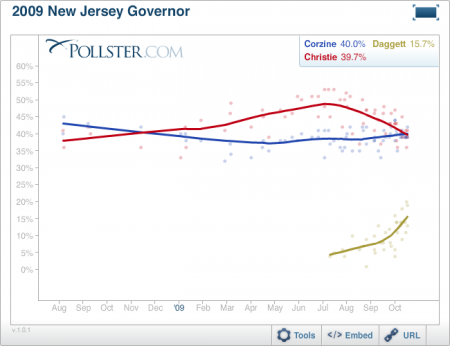By: Inoljt, http://thepolitikalblog.wordpr…
The New Jersey governor’s election is less than two weeks away, and it deserves far more attention than I have been giving it. Nevertheless, I will now belatedly share some thoughts that have been stewing in my head.
Here is a snapshot of the race as of 10/25:

There are several unmistakable trends here. The challenger Attorney Chris Christie gains a double-digit lead over the incumbent, for fairly obvious reasons. Then, mysteriously, he proceeds to lose it. Incumbent Governor Jon Corzine’s share of the vote mostly remains flat but – and this is important – trends slightly upward. While the two main candidates blast each other, third-party candidate Chris Daggett draws support at an accelerating rate.
Mr. Corzine’s positive trend should encourage Democrats; it indicates that he is actually building support, not just tearing down Mr. Christie. In addition, expect Mr. Daggett to overperform on election day as he reaches viability. Normally, third-party candidates perform below their polling; this election, however, with both major candidates highly unpopular, constitutes anything but a normal situation.
The strangest and most interesting part of the campaign, however, has been the story of Mr. Christie.
More below.
He challenged an unpopular incumbent, under hugely favorable macropolitical conditions, and by summer had attained a double-digit lead. Then Mr. Christie’s support began sliding, a trend that continues to this day. He went from polling barely below 50% to polling barely below 40%.
I am at a loss to explain why this has happened. The fundamentals behind the race haven’t changed; the economy remains weak and Mr. Corzine much disliked. Scandal has not upended Christie; if anything, it has hurt Corzine more. Obviously the governor has run the better campaign, but campaigns generally do not erase double-digit leads.
Indeed, this race runs counter to a fundamental theme of politics: if a challenger of an unpopular incumbent attains a substantial lead, it is almost always a futile effort eroding the advantage. The unpopular incumbent – whether it be Herbert Hoover, Jimmy Carter, or Rick Santorum – will inevitably lose. In fact, I cannot name a single election in which a candidate with a double-digit edge, facing a disliked incumbent, has lost that edge barring major scandal.
Part of the answer may lay with Chris Christie himself. The man seems, plain and simple, a bad candidate. For some reason or other, the inhabitants of New Jersey just don’t like the guy. It’s the same problem that cursed John Edwards and Mitt Romney during the primaries. No matter how well-run their campaigns, no matter how good their ideas, people just wouldn’t vote for them. Christie perfectly fits this description – an irony, given that Republicans nominated him because he appeared a strong candidate.
The same, of course, could be said for Corzine; both nominees have tremendous weaknesses. That is why this race is so close less than two weeks before election day.
has a love/hate relationship with its politicians. It always hates them but always re-elects them.
in New Jersey.
In 1977, Governor Brendan Byrne trailed by double digits the entire summer and in the fall, turned it around in October and won by 12%.
In 1993, Governor Jim Florio trailed by nearly 20% the whole year, but came back at the end, actually took the lead in the last week before losing by 1%.
In 1997, Governor Christine Whitman led big throughout the race, but Jim McGreevey came back to lose by a razor thin margin. (I know this is not the model you are looking at.)
would have won this race. He is clearly a certified wingnut, but at least he didn’t have ethical issues.
for this race and seeing it now only reinforces my belief that Christie will eke out a victory. The fact that Corzine hasnt gained one bit and his lead is only due to Christie crashing and more voters going to Dagget, well, if Dagget is able to get that 13% he’s polling at, Corzine will win. If even a percentage point or two go from Dagget to Christie, then Christie is probably going to win.
Man I hope Im wrong!